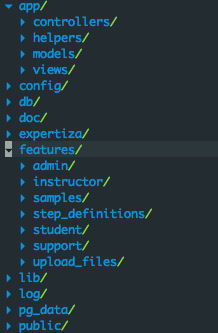Using Cucumber with Expertiza: Difference between revisions
No edit summary |
|||
| Line 62: | Line 62: | ||
<pre>bundle exec cucumber</pre> | <pre>bundle exec cucumber</pre> | ||
=== Run a Single Feature === | === Run a Single Feature === | ||
To run all scenarios for a single cucumber feature one must specify the feature file name | To run all scenarios for a single cucumber feature one must specify the feature file name. | ||
<pre>bundle exec cucumber features/admin/impersonate_user.feature</pre> | <pre>bundle exec cucumber features/admin/impersonate_user.feature</pre> | ||
=== Run a Single Scenario === | |||
You can run specific scenario within a feature by specifying the line number. The following would run the scenario titled "Impersonate a student as an Administrator." | |||
<pre>bundle exec cucumber features/admin/impersonate_user.feature:5</pre> | |||
Alternatively, you can specify the name of a scenario to run its instance. | |||
<pre>bundle exec cucumber features --name "Impersonate a student as an Administrator"</pre> | |||
=== Run Tagged Features and/or Scenarios === | |||
More information about running tests that share tags can be found in the [https://github.com/cucumber/cucumber/wiki/Tags Cucumber Wiki] | |||
===Environment Configuration=== | ===Environment Configuration=== | ||
==== env.rb ==== | ==== env.rb ==== | ||
Revision as of 23:53, 8 February 2013
Cucumber Stack
Features
Features provide a brief description about the functionality being tested.
In Expertiza, features are stored in /features. Within this folder you can find several sub-folders such as /admin, /instructor, and /student. This structure is to organize tests that apply to specific roles.

Each .feature file tests a specific aspect of the system, such as an Administrator's ability to Impersonate a User. (/features/admin/impersonate_user.feature) A feature is written in an explanatory syntax called Gherkin. For the Impersonate User feature, a feature would be described as.
Feature: Impersonate User
As an Administrator
I should be able to impersonate users
Scenarios
Each feature file can contain multiple scenarios. This is to test the same feature in different ways using the Given-When-Then structure. For example. An administrator should be able to impersonate an existing student, but he should not be able to impersonate a student that doesn't exist. In the case of an instructor, he should only be able to impersonate students that are in his class.
Scenario: Impersonate a student as an Administrator
Given an Administrator named "cucumber" exists
And a Student named "impersonated_account" created by "cucumber" exists
When I log in as "cucumber"
And I click the menu link "Impersonate User"
And I fill in "user_name" with "impersonated_account"
When I press "Impersonate"
Then I should be logged in as "impersonated_account"
Scenario: Impersonate a student that does not exist
Given an Administrator named "cucumber" exists
When I log in as "cucumber"
And I click the menu link "Impersonate User"
And I fill in "user_name" with "impersonated_account"
When I press "Impersonate"
Then I should see "No user exists with the name 'impersonated_account'"
Gherkin provides multiple keywords to describe steps in a scenario such as:
- Feature
- Background
- Scenario
- Given
- When
- Then
- And
- But
- Scenario Outline
- Examples
Step Definitions
Running Cucumber
Before running cucumber, make sure all necessary gems are installed by running
bundle install
Create the database and tables
rake db:create
Optionally prepare the test database
rake db:test:prepare
Run all Features
To run all cucumber features found within the /features directory
bundle exec cucumber
Run a Single Feature
To run all scenarios for a single cucumber feature one must specify the feature file name.
bundle exec cucumber features/admin/impersonate_user.feature
Run a Single Scenario
You can run specific scenario within a feature by specifying the line number. The following would run the scenario titled "Impersonate a student as an Administrator."
bundle exec cucumber features/admin/impersonate_user.feature:5
Alternatively, you can specify the name of a scenario to run its instance.
bundle exec cucumber features --name "Impersonate a student as an Administrator"
Run Tagged Features and/or Scenarios
More information about running tests that share tags can be found in the Cucumber Wiki
Environment Configuration
env.rb
Cucumber configuration variables can be edited in /features/support/env.rb
seeds.rb
The database can be prepopulated with data every time cucumber is run by editing the file /features/support/seeds.rb
Cucumber decorators
Running Tests
Run all features Run a single feature Run a single scenario Undefined steps Sample output and what it means